“Sweden performs exceptionally well in overall well-being, as shown by the fact that it ranks among the top countries in a large number of topics in the Better Life Index,” the OECD said in a statement.
The index, which looks at 34 OECD members and key trading partners Brazil, Russia, China, India, Indonesia and South Africa, was dominated by European countries. Canada came in third, however, ahead of both Norway and Switzerland, while the United States was ranked sixth.
Denmark, the Netherlands, Iceland and the United Kingdom nabbed the remaining spots on the top-ten list.
“Money, while it cannot buy happiness, is an important means to achieving higher living standards,” the OECD noted.
While Sweden’s average household net-adjusted disposable income was calculated at $26,242 a year, more than the $2,000 above the OECD average, the organization nonetheless noted a considerable wage gap on the income scale.
“There is a considerable gap between the richest and poorest – the top 20 percent of the population earn more than four times as much as the bottom 20 percent,” the summary said.
On the job market, both Swedish men and women have high labour participation and most worked fewer hours than their OECD counterparts. Only one percent of Swedes work very long hours, while across the member states about nine percent are regularly putting in extra time at work.
Swedish men’s and women’s labour market participation are almost on par with one another, with 76 percent of men working, while 72 percent of women also have jobs. The difference of four percentage points is well below the OECD average difference of 12 percent.
“(It) suggests Sweden has generally been successful in addressing the constraints and barriers women face accessing work,” the report noted.
The OECD faulted Sweden, however, on the high level of employees on fixed-term contracts. Close to 14 percent of Swedes have temporary contracts, while the OECD average is ten percent.
“Another essential factor of employment quality is job security. Employees working on temporary contracts are more vulnerable than workers with an open-ended contract,” the report noted.
“This figure suggests greater stabilization of working contracts could be encouraged for Swedish employees.”
The Better Life Index is partly based on rankings made by OECD citizens online about their lives, making the measurements objective. The index also looks at several facets of life that play into well-being and happiness, including air and water quality.
“The level of atmospheric PM10 – tiny air pollutant particles small enough to enter and cause damage to the lungs – is 10 microgrammes per cubic meter, considerably lower than the OECD average of 21 microgrammes per cubic metre,” the report noted.
“Sweden also does well in terms of water quality, as 95 percent of people say they are satisfied with the quality of their water, compared with an OECD average of 84 percent.”
The index also looks at how citizens feel about their community and society.
“Ninety-two percent of people believe that they know someone they could rely on in time of need, slightly higher than the OECD average of 90 percent,” the report authors noted.
It also said that voter turnout was a key measurement of citizens trust in their government and their own input in the political process. Eighty-four percent of Swedes make their way to the polling station on election day, 12 percentage points more than the OECD average.
More than nine out of ten Swedes are happy with their living situation, and they spend about 22 percent of their income on rents or mortgage payments, which is in line with the OECD average.
Overall, as many as 85 percent of Swedes said their average day was full of positive experiences more often than bad ones – whether that be feeling rested enough, taking pride in their work, or feeling a general sense of happiness.
Ann Törnkvist



 Please whitelist us to continue reading.
Please whitelist us to continue reading.
Member comments